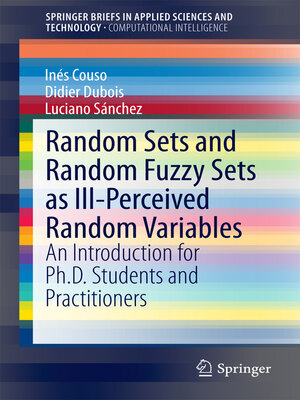Random Sets and Random Fuzzy Sets as Ill-Perceived Random Variables
ebook ∣ An Introduction for Ph.D. Students and Practitioners · SpringerBriefs in Applied Sciences and Technology
By Inés Couso

Sign up to save your library
With an OverDrive account, you can save your favorite libraries for at-a-glance information about availability. Find out more about OverDrive accounts.
Find this title in Libby, the library reading app by OverDrive.



Search for a digital library with this title
Title found at these libraries:
| Library Name | Distance |
|---|---|
| Loading... |
This short book provides a unified view of the history and theory of random sets and fuzzy random variables, with special emphasis on its use for representing higher-order non-statistical uncertainty about statistical experiments. The authors lay bare the existence of two streams of works using the same mathematical ground, but differing form their use of sets, according to whether they represent objects of interest naturally taking the form of sets, or imprecise knowledge about such objects.
Random (fuzzy) sets can be used in many fields ranging from mathematical morphology, economics, artificial intelligence, information processing and statistics per se, especially in areas where the outcomes of random experiments cannot be observed with full precision. This book also emphasizes the link between random sets and fuzzy sets with some techniques related to the theory of imprecise probabilities.
This small book is intended for graduate and doctoral students in mathematics or engineering, but also provides an introduction for other researchers interested in this area. It is written from a theoretical perspective. However, rather than offering a comprehensive formal view of random (fuzzy) sets in this context, it aims to provide a discussion of the meaning of the proposed formal constructions based on many concrete examples and exercises. This book should enable the reader to understand the usefulness of representing and reasoning with incomplete information in statistical tasks. Each chapter ends with a list of exercises.







